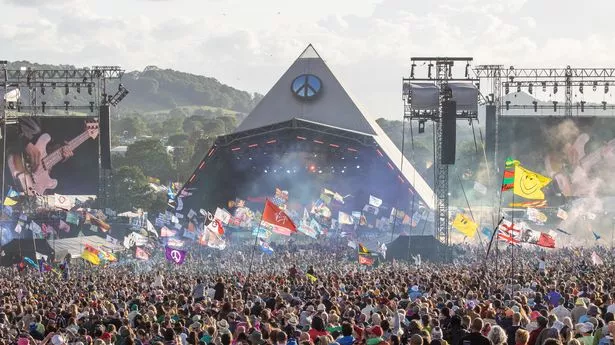The remarks made by Emily Eavis, organiser of the Glastonbury Festival, about the scarcity of new rock acts to headline the festival has sparked a heated broader conversation about the current state of rock music and its place in today’s music industry. Eavis’s candid and arguably ignorant comments reflect a notable shift in the music landscape, where rock music seems to have drifted from its mainstream prominence – unless the nostalgia factor comes into play.
Naturally, her comments rubbed plenty of people the wrong way, including the rock-adjacent acts who are pouring their blood, sweat and tears into their careers and those who follow and champion them. Yet, Glastonbury isn’t the only major UK festival which is struggling to find fresh rock headliners. Take Download for example; the biggest acts this year included Queens of the Stone Age, Fall Out Boy, Avenged Sevenfold, The Offspring, Machine Head and Pantera; the only relatively fresh blood among the acts was Royal Blood, who have still been around for more than a decade.
So why is it that new rock artists in the UK are relegated to smaller stages or shunned from festivals entirely? The answer lies within a conflating myriad of factors which will be outlined below, followed by an outline of ways to remedy the crumbling talent pipeline and revive the genre.
Why Emerging Rock Artists Have Been Pushed to the Festival Line-Up Sidelines
Even if the torch you carry for rock hasn’t diminished, the popular shift away from rock towards pop, hip-hop, and electronica can’t be dismissed. Dominant artists and genres will naturally draw larger crowds, hence festival bookers being more inclined to allocate prime space to them. With music festivals feeling the pinch more than ever, leading to more than 42 festival organisers in the UK and Ireland cancelling, postponing or totally laying to rest their events, playing it safe with the line-ups in this economy is vital for organisers if they want to see another year.
It is crucial to remember that festivals operate on a commercial basis and prioritise acts that guarantee large audiences and higher returns. As rock is perceived to have a smaller or more niche following compared to other genres, rock bands often end up on smaller stages. While it is a bitter pill for rock fans to swallow that their favoured genre is no longer the flavour of the era and they are no longer catered to by festival bills, acceptance of this fact and that festivals aren’t patrons of the arts, but commercial entities, removes some of the confusion and contempt from the equation.
Other factors which may contribute to new rock artists struggling to secure coveted spots on festival line-ups include the evolution of marketing trends, which modernistically focuses on viral marketing and social media presence, and the change in festival dynamics, which has seen many modern festivals are embracing a more eclectic approach to their line-ups to reflect cultural diversity and inclusivity, which can sometimes mean traditional rock bands find less prominence.
The Future of Rock: A Revival?
While the current scenario might seem grim for rock fans, the genre’s revival is not out of the question. Music trends are cyclical, and the essence of rock—its raw emotion and the energy of live performances—continues to have a dedicated following. The challenge lies in adapting to the new musical landscape without losing the genre’s authentic appeal.
There is no shortage of contemporary rock bands with the talent, the songwriting stripes, and the charisma to lead illustrious chart-topping careers. However, as any independent artist will tell you, without major financial backing, it is practically impossible to elevate their standing in the music industry. As current collective tastes are geared toward other genres, it isn’t likely that many labels will want to take the risk on emerging rock bands, leading to a Catch-22 situation where the rock scene has stagnated and only the bands which thrived while rock was the dominant genre are revered in popular culture.
Addressing the Talent Pipeline
Emily Eavis was unequivocally wrong in her statement that there are no new rock bands; what would have been a more accurate assessment is that the industry has ceased to gamble/capitalise on and nurture new talent.
She is also underplaying her own responsibility in the death of rock music; for rock to regain prominence, new talent needs platforms, and what could be a better platform than Glastonbury? After all, it is one of the only festivals that people fall over themselves to buy tickets for before actually seeing the line-up! So many Glastonbury-goers claim that it’s not about the music, it is about the experience, making it the perfect festival for little-known artists to gain a foothold in the music industry.
In Conclusion
While Emily Eavis’s remarks on the scarcity of new rock acts at Glastonbury might seem to signal a bleak future for the genre, it is essential not to view this as an absolute demise.
Rock music’s position within the contemporary music industry has shifted, facing significant competition from genres that resonate more with today’s digital and streaming cultures. However, this does not preclude a resurgence. Rock music, with its deep roots and passionate fan base, has the potential to adapt and reassert itself in the mainstream. It necessitates an environment where new talents are nurtured and given opportunities to shine, much like what Glastonbury and other festivals could offer.
Rather than seeing Eavis’s comments as a final verdict on rock music, they should be interpreted as a call to action—to the industry, to festival organisers, and to fans—to rekindle their commitment to a genre that thrives on live performance and raw emotional energy. By fostering new talent and embracing the evolving dynamics of the music scene, the genre has the potential to find its way back to prominence, proving that its spirit is far from extinguished.
Article by Amelia Vandergast


